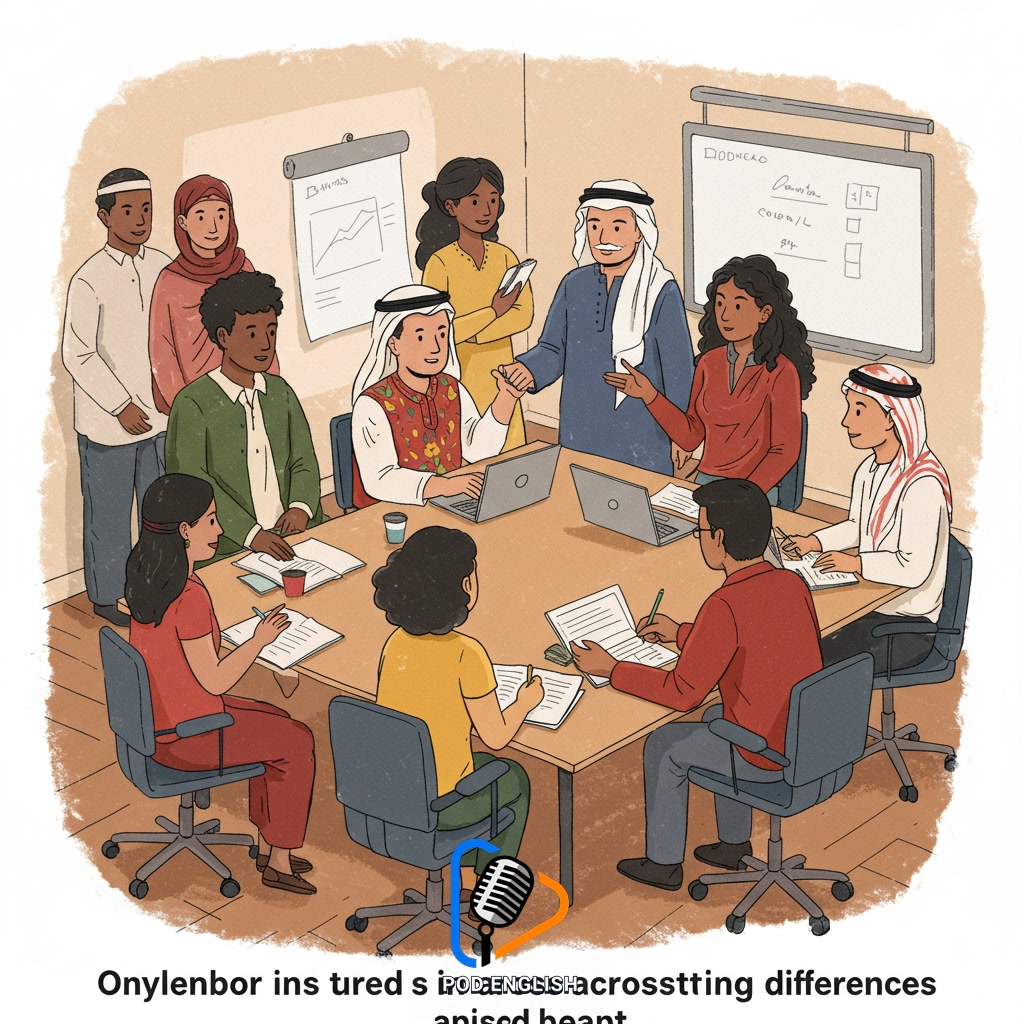Learn English
Learn English for Effective Global HR Communication

This content focuses on learning English skills essential for Human Resources professionals operating in a global environment. It aims to enhance communication effectiveness in HR tasks, enabling clearer interactions with international colleagues and stakeholders. Mastering English is presented as a key component for success in global HR roles, facilitating better understanding and collaboration across diverse cultures.
Table of Contents
- Section 1: The Critical Importance of English in Global HR
- Section 2: Core English Language Skills for HR Professionals
- Section 3: Mastering Specific HR Communication Scenarios in English
- Section 4: Effective Strategies for Learning and Improving HR English
- Section 5: Cultural Nuances and Intercultural Communication in Global HR
- Section 6: Applying English Skills and Continuous Learning for Career Growth
Section 1: The Critical Importance of English in Global HR
In today’s interconnected world, Human Resources operates far beyond national borders. Managing diverse global teams, navigating international labor laws, and fostering a unified company culture across different regions all require clear and effective communication. English has emerged as the dominant language for international business, making it an indispensable tool for HR professionals in a global context. Mastering English skills is not just about understanding words; it’s about building trust, resolving conflicts, conducting interviews, explaining complex policies, and collaborating seamlessly with colleagues and stakeholders from various linguistic backgrounds. Without strong English proficiency, HR efforts in a global setting can be hampered by misunderstandings, inefficiencies, and a failure to connect with the workforce. Therefore, learning English is absolutely critical for anyone aspiring to or currently working in global HR roles, enabling them to perform their duties effectively and contribute significantly to their organization’s international success.

The Critical Importance of English in Global HR
Section 2: Core English Language Skills for HR Professionals
Following the understanding that global HR requires international interaction, this section delves into the foundational English language skills indispensable for professionals in this field. Beyond basic conversational ability, effective global HR communication necessitates proficiency in specific areas. Key skills include clear and concise written communication for emails, reports, and policy documents, ensuring understanding across diverse linguistic backgrounds. Strong verbal communication is crucial for conducting interviews, leading meetings, mediating conflicts, and delivering presentations to international teams. Active listening skills are equally vital for accurately grasping nuances and cultural sensitivities during conversations. Furthermore, understanding HR-specific vocabulary and terminology in English is essential for navigating legal documents, contracts, and performance reviews. Mastering these core skills forms the bedrock for successful interaction and collaboration within a multicultural workforce.

Core English Language Skills for HR Professionals
Section 3: Mastering Specific HR Communication Scenarios in English
Building upon the foundational English skills discussed previously, this section focuses on applying those abilities to specific, common communication scenarios encountered daily by HR professionals in a global setting. Rather than just understanding grammar and vocabulary, you will learn how to effectively navigate real-world interactions. This includes mastering the language needed for tasks such as conducting interviews with candidates from diverse linguistic backgrounds, delivering performance feedback clearly and constructively, resolving cross-cultural conflicts, writing professional emails and reports, and giving presentations on HR policies to international teams. The goal is to move beyond basic fluency to achieve true communicative competence, ensuring your message is understood accurately and appropriately, fostering positive relationships and efficient operations across global teams.

Mastering Specific HR Communication Scenarios in English
Section 4: Effective Strategies for Learning and Improving HR English
Building upon the foundational English skills and their application in specific scenarios, this section outlines effective strategies for HR professionals to continuously learn and improve their English proficiency specifically for the workplace. Key approaches include dedicated vocabulary building focused on HR terminology, active listening to HR-related discussions and content, engaging in realistic role-playing exercises simulating common HR interactions, and utilizing online learning platforms or resources tailored for business and HR English. Consistent practice, seeking feedback, and immersing oneself in relevant English content are crucial steps. These strategies empower HR professionals to enhance their clarity, confidence, and effectiveness when communicating in English within a global team context, directly supporting the overall goal of mastering English for success in international HR roles.

Effective Strategies for Learning and Improving HR English
Section 5: Cultural Nuances and Intercultural Communication in Global HR
Building upon foundational English skills, global HR professionals must delve into the critical area of cultural nuances and intercultural communication. Effective communication extends beyond grammar and vocabulary; it requires understanding how cultural backgrounds influence communication styles, non-verbal cues, expectations regarding feedback, hierarchy, and decision-making processes. Recognizing and navigating these differences is vital for successful recruitment, performance management, conflict resolution, and fostering an inclusive environment across diverse teams. Mastering the English language, paired with a deep awareness of cultural sensitivities, empowers HR to build stronger relationships, prevent misunderstandings, and ensure equitable treatment for employees worldwide, ultimately enhancing overall organizational effectiveness in a global context.

Cultural Nuances and Intercultural Communication in Global HR
Section 6: Applying English Skills and Continuous Learning for Career Growth
Building upon understanding cultural nuances, the practical application of English skills is paramount for global HR professionals aiming for career advancement. Simply knowing grammar and vocabulary isn’t enough; you must confidently use English in real-world scenarios like conducting international interviews, drafting policies for diverse teams, resolving cross-cultural conflicts, and leading global training sessions. This active application solidifies learning and builds confidence. Furthermore, the global landscape constantly evolves, requiring continuous learning – staying updated on global HR trends, legal changes, and refining language skills through practice and further study. By consistently applying and improving your English proficiency, you demonstrate capability and adaptability, positioning yourself for greater responsibilities and significant career growth within the international HR field.

Applying English Skills and Continuous Learning for Career Growth













